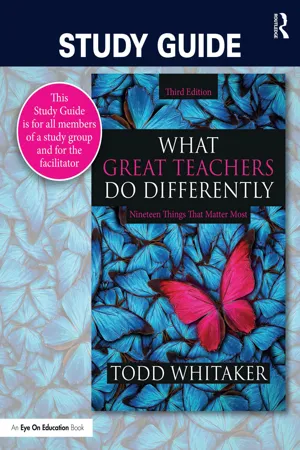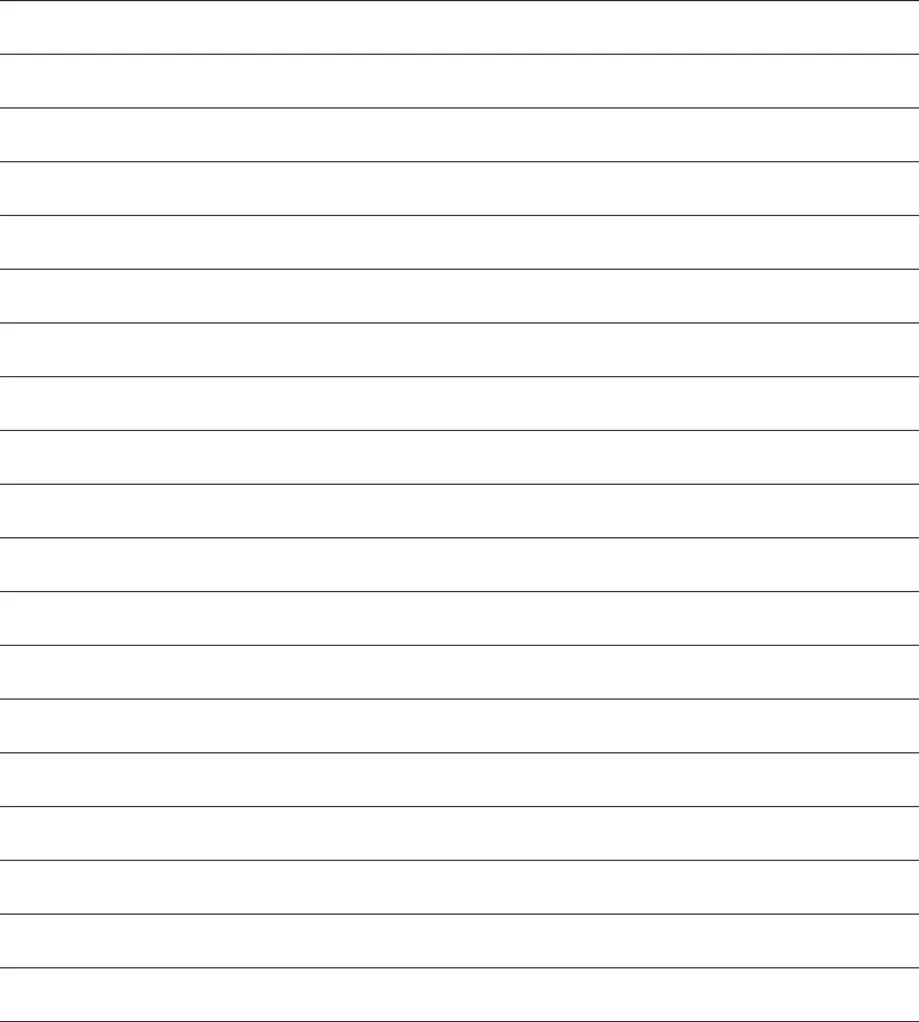
eBook - ePub
Study Guide: What Great Teachers Do Differently
Nineteen Things That Matter Most
- 92 pages
- English
- ePUB (mobile friendly)
- Available on iOS & Android
eBook - ePub
Study Guide: What Great Teachers Do Differently
Nineteen Things That Matter Most
About this book
Written to accompany the third edition of Todd Whitaker's bestselling title, What Great Teachers Do Differently, this study guide can be used by facilitators and participants in workshops, webinars, book study groups, or other professional development events. The guide features a variety of strategies and activities that will help teachers apply the book's concepts to their own classroom situation, so they can get the most out of the book and increase their impact in the classroom. Each chapter includes:
Key Concepts
Discussion Questions
Journal Prompts
Group Activities
Application Strategies
With this study guide, teachers will have a fun, collaborative, meaningful tool to assist with professional growth.
Frequently asked questions
Yes, you can cancel anytime from the Subscription tab in your account settings on the Perlego website. Your subscription will stay active until the end of your current billing period. Learn how to cancel your subscription.
No, books cannot be downloaded as external files, such as PDFs, for use outside of Perlego. However, you can download books within the Perlego app for offline reading on mobile or tablet. Learn more here.
Perlego offers two plans: Essential and Complete
- Essential is ideal for learners and professionals who enjoy exploring a wide range of subjects. Access the Essential Library with 800,000+ trusted titles and best-sellers across business, personal growth, and the humanities. Includes unlimited reading time and Standard Read Aloud voice.
- Complete: Perfect for advanced learners and researchers needing full, unrestricted access. Unlock 1.4M+ books across hundreds of subjects, including academic and specialized titles. The Complete Plan also includes advanced features like Premium Read Aloud and Research Assistant.
We are an online textbook subscription service, where you can get access to an entire online library for less than the price of a single book per month. With over 1 million books across 1000+ topics, we’ve got you covered! Learn more here.
Look out for the read-aloud symbol on your next book to see if you can listen to it. The read-aloud tool reads text aloud for you, highlighting the text as it is being read. You can pause it, speed it up and slow it down. Learn more here.
Yes! You can use the Perlego app on both iOS or Android devices to read anytime, anywhere — even offline. Perfect for commutes or when you’re on the go.
Please note we cannot support devices running on iOS 13 and Android 7 or earlier. Learn more about using the app.
Please note we cannot support devices running on iOS 13 and Android 7 or earlier. Learn more about using the app.
Yes, you can access Study Guide: What Great Teachers Do Differently by Todd Whitaker,Beth Whitaker in PDF and/or ePUB format, as well as other popular books in Education & Education General. We have over one million books available in our catalogue for you to explore.
Information
1
Chapter 1: Why Look at Great?
Chapter 2: It’s People, Not Programs

- ★ Great teachers do not use sarcasm, yell at kids, or argue with students in front of their peers.
- ★ Educators can always learn from observing what great teachers do. Eliminating inappropriate choices does not help as much as identifying good ideas used by successful educators.
- ★ All that is truly needed to improve education is for all teachers to be like our very best teachers.
- ★ Who we are as teachers and what we do as teachers are more important than what we know. Teachers must self-reflect on who they are and what they must do in order to improve their practice.
- ★ There are really only two ways to improve any school: get better teachers and improve the teachers already there.
- ★ No program inherently leads to school improvement. It is the people who implement sound programs who determine the success of the school. Programs are never the solution and they are never the problem.
- ★ What matters most is not what teachers do (including “programs” such as whole language, assertive discipline, or open classrooms), but how appropriately and effectively they do it.

- What is the most important idea communicated in these two chapters? How would you implement this idea in your classroom?
- Why should we look at what great teachers do?
- In what ways is looking at ineffective teachers pointless? On the other hand, why must we also study less effective teachers and schools when determining what constitutes great teachers and schools?
- What is it that determines—in the eyes of parents and students—whether or not a school is great?
- Are open classrooms, whole language, and assertive discipline programs inherently good or bad? Explain.
- When considering whether or not to adopt a school program change, what should stand as the primary criterion?
- In the phrase “poor lecturer’s classroom,” which of these three words captures the problem? How is this single example illustrative of the “people versus programs” concept?

Think of a program that has been implemented in recent years at your school or a school with which you are familiar. Which teachers adapted to the change of programs, embracing the new idea and making it work? Did any teachers resist the change? Was the program ultimately deemed a success? What determined whether or not it was successful?


38 Years of Teaching Fifth Grade …
In small groups of three to five, ask participants to consider the following two points: (1) Some teachers have twenty years of teaching experience; others who have taught for twenty years have one year of experience that they have repeated twenty times. (2) Students want to know how much you care before they care how much you know. On page 5 of the text, there is a description of a teacher who taught the same grade effectively for thirty-eight years. Have participants use the scenarios above and discuss how they apply to this particular teacher. Have groups create a list with three categories: what she knew as a teacher, who she was as a teacher, and what she did as a teacher. Based on the description of this effective veteran teacher, ask participants to brainstorm possible outcomes within each category that would likely have applied to her and her knowledge, passion, and practices as an educator. Participants should be prepared to share these lists with the entire group.
It’s Not What You Do, It’s How You Do It
Beginning on page 7 of the text, three “programs” are described that are deemed neither a problem nor a solution: open classrooms, assertive discipline, and lecturing. Participants should be divided into three groups. Ask each group to review one section of the text (“How Open Classrooms Got Started,” “Assertive Discipline—the Problem or the Solution,” and “The Poor Lecturer’s Classroom”). Each group should then create and present a skit to the entire group showing how the program in question can be both an effective and an ineffective strategy in teaching.
Notes

In his book Good to Great: Why Some Companies Make the Leap … and Others Don’t, Jim Collins1 maintains that good is actually the enemy of great. That is, the reason there are so few great companies is that so many people are willing to settle for good companies. He extends the examples to schools, indicating that the reason we have so few great schools is primarily that we have good schools. Whitaker’s text, too, speaks to the shade of difference between good and great teachers, stating that most teachers do about as well as they know how. Maintaining anonymity, identify two teachers who are settling for good and two teachers who always strive for greatness. What is the obvious difference between the two pairs? Write your insights and reflect on what the great teachers are doing differently from those classified as merely “good.” Share these observations at the next session.
1. Collins, J. (2001). Good to great: Why some companies make the leap … and others don’t. New York, NY: HarperCollins.
Notes
2
Chapter 3: The Power of Expectations

- ★ Great teachers focus on expectations; moderately effective teachers focus on rules; the least effective teachers focus on the consequences of breaking the rules.
- ★ Great teachers establish clear expectations at the outset of the school year and follow them firmly, fairly, and consistently throughout the year.
- ★ Rules have drawbacks, including the fact that they focus on undesirable behaviors. Expectations focus on desirable behaviors.
- ★ Teachers may have varying expectations, but all great teachers set expectations that are clearly established, focused on the future, and consistently reinforced.

- What is the most important idea communicated in this chapter regarding teacher expectations?
- What are the advantages and disadvantages of spelling out specific consequ...
Table of contents
- Cover
- Half Title
- Title Page
- Copyright Page
- Contents
- Introduction
- Part One
- Part Two
- Part Three
- Part Four
- Part Five
- Part Six
- Part Seven
- Part Eight
- Part Nine
- Part Ten
- Part Eleven
- Part Twelve
- Part Thirteen
- Part Fourteen
- Part Fifteen
- Part Sixteen
- Part Seventeen
- Nineteen Things That Matter Most